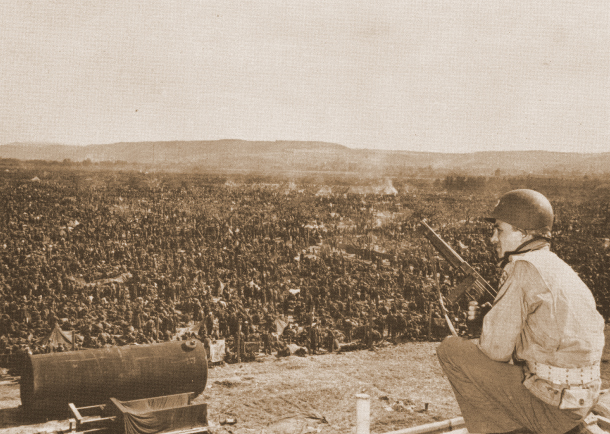 Soon after the Allied victory in Europe, the purge of National Socialist Party members from government, business, industry, science, education, and all other walks of German life commenced. While a surprising number of Nazis were allowed—even compelled—to man their posts temporarily to enable a smooth transition, all party members, high and low, were sooner or later excised from German daily life. In theory, “denazification” was a simple replacement of National Socialist officials with those of democratic or communist underpinnings. In practice, the purge became little more than a cloak for rape, torture and death.
Soon after the Allied victory in Europe, the purge of National Socialist Party members from government, business, industry, science, education, and all other walks of German life commenced. While a surprising number of Nazis were allowed—even compelled—to man their posts temporarily to enable a smooth transition, all party members, high and low, were sooner or later excised from German daily life. In theory, “denazification” was a simple replacement of National Socialist officials with those of democratic or communist underpinnings. In practice, the purge became little more than a cloak for rape, torture and death.
Because their knowledge of the language and culture was superb, many of the intelligence officers accompanying US and British forces into the Reich were Jewish refugees who had fled Germany in the late 1930s. Although their American and English “aides” were hardly better, the fact that many of these “39ers” became interrogators, examiners and screeners, with old scores to settle, insured that Nazis—or any German, for that matter—would be shown no mercy.
One man opposed to the vengeance-minded program was George Patton.
“Evidently the virus started by Morgenthau and Bernard Baruch of a Semitic revenge against all Germans is still working,” wrote the general in private. “I am frankly opposed to this war-criminal stuff. It is not cricket and it is Semitic… I can’t see how Americans can sink so low.”
Soon after occupation, all adult Germans were compelled to register at the nearest Allied headquarters and complete a lengthy questionnaire on their past activities. While many nervous citizens were detained then and there, most returned home, convinced that at long last the terrible ordeal was over. For millions, however, the trial had but begun.
“Then it started,” whispered Anna Fest, a woman who had registered with the Americans six weeks earlier.
Such a feeling of helplessness, when three or four heavily armed military police stand in front of you. You just panic. I cried terribly. My mother was completely beside herself and said, “You can’t do this. She registered just as she was supposed to.” Then she said, “If only you’d gone somewhere else and had hidden.” But I consider that senseless, because I did not feel guilty… That was the way it went with everyone, with no reason given.
Few German adults, Nazi or not, escaped the dreaded knock on the door. Far from being dangerous fascists, Freddy and Lali Horstmann were actually well-known anti-Nazis. Recounts Lali from the Soviet Zone:
“I am sorry to bother you,” he began, “but I am simply carrying out my orders. Until when did you work for the Foreign Office?”
“Till 1933,” my husband answered.
“Then you need fear nothing,” Androff said. “We accuse you of nothing, but we want you to accompany us to the headquarters of the NKVD, the secret police, so that we can take down what you said in a protocol, and ask you a few questions about the working of the Foreign Office…”
We were stunned for a moment; then I started forward, asking if I could come along with them.
“Impossible,” the interpreter smiled.
My heart raced. Would Freddy answer satisfactorily? Could he stand the excitement? What sort of accommodation would they give him?
“Don’t worry, your husband has nothing to fear,” Androlf continued. “He will have a heated room. Give him a blanket for the night, but quickly, we must leave…”
There was a feeling of sharp tension, putting the soldier on his guard, as though he were expecting an attack from one of us. I took first the soldier, then the interpreter, by their hands and begged them to be kind to Freddy, repeating myself in the bustle and scraping of feet that drowned my words. There was a banging of doors. A cold wind blew in. I felt Freddy kiss me. I never saw him again.
“We were wakened by the sound of tires screeching, engines stopping abruptly, orders yelled, general din, and a hammering on the window shutters. Then the intruders broke through the door, and we saw Americans with rifles who stood in front of our bed and shone lights at us. None of them spoke German, but their gestures said: ‘Get dressed, come with us immediately.’ This was my fourth arrest.”
Thus wrote Leni Riefenstahl, a talented young woman who was perhaps the world’s greatest film-maker. Because her epic documentaries—Triumph of the Will and Olympia—seemed paeans to not only Germany, but National Socialism, and because of her close relationship with an admiring Adolf Hitler, Leni was of more than passing interest to the Allies. Though false, rumors also hinted that the attractive, sometimes-actress was also a “mistress of the devil”—that she and Hitler were lovers.
“Neither my husband nor my mother nor any of my three assistants had ever joined the Nazi Party, nor had any of us been politically active,” said the confused young woman. “No charges had ever been filed against us, yet we were at the mercy of the Allies and had no legal protection of any kind.”
Soon after Leni’s fourth arrest, came a fifth.
The jeep raced along the autobahns until, a few hours later… I was brought to the Salzburg Prison; there an elderly prison matron rudely pushed me into the cell, kicking me so hard that I fell to the ground; then the door was locked. There were two other women in the dark, barren room, and one of them, on her knees, slid about the floor, jabbering confusedly; then she began to scream, her limbs writhing hysterically. She seemed to have lost her mind. The other woman crouched on her bunk, weeping to herself.
As Leni and others quickly discovered, the “softening up” process began soon after arrival at an Allied prison. When Ernst von Salomon, his Jewish girlfriend and fellow prisoners reached an American holding pen near Munich, the men were promptly led into a room and brutally beaten by military police. With his teeth knocked out and blood spurting from his mouth, von Salomon moaned to a gum-chewing officer, “You are no gentlemen.” The remark brought only a roar of laughter from the attackers. “No, no, no!” the Gis grinned. “We are Mississippi boys!” In another room, military policemen raped the women at will while leering soldiers watched from windows.
After such savage treatment, the feelings of despair only intensified once the captives were crammed into cells.
“The people had been standing there for three days, waiting to be interrogated,” remembered a German physician ordered to treat prisoners in the Soviet Zone. “At the sight of us a pandemonium broke out which left me helpless… As far as I could gather, the usual senseless questions were being reiterated: Why were they there, and for how long? They had no water and hardly anything to eat. They wanted to be let out more often than once a day… A great many of them have dysentery so badly that they can no longer get up.”
“Young Poles made fun of us,” wept a woman from her cell in the same zone. “They threw bricks through the windows, paper bags with sand, and skins of hares filled with excrement. We did not dare to move or offer resistance, but huddled together in the farthest corner, in order not to be hit, which could not always be avoided… We were never free from torments.”
“For hours on end I rolled about on my bed, trying to forget my surroundings,” recalled Leni Riefenstahl, “but it was impossible.”
The mentally disturbed woman kept screaming—all through the night; but even worse were the yells and shrieks of men from the courtyard, men who were being beaten, screaming like animals. I subsequently found out that a company of SS men was being interrogated.
They came for me the next morning, and I was taken to a padded cell where I had to strip naked, and a woman examined every square inch of my body. Then I had to get dressed and go down to the courtyard, where many men were standing, apparently prisoners, and I was the only woman. We had to line up before an American guard who spoke German. The prisoners stood to attention, so I tried to do the same, and then an American came who spoke fluent German. He pushed a few people together, then halted at the first in our line. “Were you in the Party?”
The prisoner hesitated for a moment, then said: “Yes.”
He was slugged in the face and spat blood.
The American went on to the next in line.
“Were you in the Party?”
The man hesitated.
“Yes or no?”
“Yes.” And he too got punched so hard in the face that the blood ran out of his mouth. However, like the first man, he didn’t dare resist. They didn’t even instinctively raise their hands to protect themselves. They did nothing. They put up with the blows like dogs.
The next man was asked:
“Were you in the Party?”
Silence.
“Well?”
“No,” he yelled, so no punch. From then on nobody admitted that he had been in the Party and I was not even asked.
As the above case illustrated, seldom was there any rhyme or reason to the examinations; all were designed to force from the victim what the inquisitor wanted to hear, whether true or false. Additionally, most such “interrogations” were structured to inflict as much pain and suffering as possible.
“A young commissar, who was a great hater of the Germans, cross examined me,” Gertrude Schulz remembered. “When he put the question: “Frauenwerk [Women’s Labor Service]?” I answered in the negative. Thereupon he became so enraged, that he beat me with a stick, until I was black and blue. I received about is blows… on my left upper arm, on my back and on my thigh. I collapsed and, as in the case of the first cross-examination, I had to sign the questionnaire.”
“Both officers who took our testimony were former German Jews,” reminisced a member of the women’s SS, Anna Fest. While vicious dogs snarled nearby, one of the officers screamed questions and accusations at Anna. If the answers were not those desired, “he kicked me in the back and the other hit me.”
They kept saying we must have been armed, have had pistols or so. But we had no weapons, none of us… I had no pistol. I couldn’t say, just so they’d leave me in peace, yes, we had pistols. The same thing would happen to the next person to testify… The terrible thing was, the German men had to watch. That was a horrible, horrible experience… That must have been terrible for them. When I went outside, several of them stood there with tears running down their cheeks. What could they have done? They could do nothing.
As part of one “interrogation” process, Johann Heilmeyer was forced to watch as Americans tied a woman’s hands to a chair, tore off her clothes, then took turns raping her. Other women were warned that if they failed to sign false confessions they would be turned over to black troops who would do with them as they saw fit.
Not surprisingly, with beatings, rape, torture, and death facing them, few victims failed to “confess” and most glad ly inked their name to any scrap of paper shown them. Some, like Anna, tried to resist. Such recalcitrance was almost always of short duration, however. Generally, after enduring blackened eyes, broken bones, electric shock to breasts—or, in the case of men, smashed testicles—only those who died during torture failed to sign confessions.
American author, Marguerite Higgins, asked and received permission to visit one “Interrogation Center.” What the writer expected to find is unclear, but what she did discover after a GI led her through the main door of the prison the lady was utterly unprepared for.
“Behind the bars of the cell we saw 3 uniformed Germans,” the woman recalled. “Two of them, beaten and covered with blood, were lying unconscious on the floor. A third German was lifted up by the hair on his head, and I shall never forget, he had red hair like a carrot. A GI turned his body over and struck him in the face. When the victim groaned, the GI roared, ‘Shut your mouth, damned Kraut!’“
To her horror, the American author soon learned that for the past fifteen minutes over a score of US soldiers had been beating and kicking the three Germans on the floor as well as three other victims nearby.
“The boy with the red hair was 14 years old,” remembered Marguerite. “The other 5 German boys in the cell blocks were between 14 and 17 years old.”
In the British Zone, a journalist stumbled upon the aftermath of yet another “interrogation.”
‘I’m afraid the prisoners don’t look exactly nice,” laughed the captain in charge.
Crumpled on the floor, laying in pools of blood, the newsman saw several German prisoners moaning. When they were ordered to stand to attention for the guest, slowly, all made the painful attempt. The first man to rise stood on uncertain legs and leaned against the wall for support. Then, his body shaking, the man made a reflexive motion with his arms as if to fend off blows. Others, with difficulty, eventually managed to stand, swaying against the wall. “Come off the wall,” shouted a British sergeant. Unsteadily, the beaten, bleeding men did as told.
In a nearby cell, the “medical officer” had just finished his examination of a German and on the floor lay the victim drenched in his own blood. “Up,” shouted the medical officer to the man when the visitor entered. “Get up.”
Painfully, using the arms of a chair, the victim tried to rise, but could not. Again he was ordered to get up. This time, on weak, shaky legs the man succeeded.
“Why don’t you kill me off?” moaned the victim as he stretched his arms pleading to the men.
“The dirty bastard is jabbering this all morning” the sergeant nearby growled.
Alone, surrounded by sadistic hate, utterly bereft of law, justice or hope, many victims understandably escaped in the only way they could—by taking their own lives. Like rays of sun in a black world of ugliness and evil, however, miracles did occur.
As guards led him back to his prison cell on painfully weakened legs, one Wehrmacht officer reflected on the insults, beatings, and tortures he had endured and contemplated suicide.
I could not see properly in the semi-darkness and missed my open cell door. A kick in the back and I was sprawling on the floor. As I raised myself I said to myself I could not, should not accept this humiliation. I sat on my bunk. I had hidden a razor blade that would serve to open my veins. Then I looked at the New Testament and found these words in the Gospel of St. John: “Without me ye can do nothing.”
With those simple, yet profound words, and despite the terrible pain and agony, the suffering soldier felt something stir within himself, something he had not felt for a very long time. His body beaten, bloody, broken, but his soul… untouched, unharmed, unshakable.
New strength seemed to rise in me. I was pondering over what seemed to me a miracle when the heavy lock turned in the cell door. A very young American soldier came in, put his finger to his lips to warn me not to speak.
“I saw it,” he said. “Here are baked potatoes.”
He pulled the potatoes out of his pocket and gave them to me, and then went out, locking the door behind him.
______________
Note of the Editor: Here you can request an item of the “Hellstorm Holocaust” package (the biggest secret in modern history: the Allied genocide of Germans after 1945), and here you can order other books by Tom Goodrich (1947-2024).




